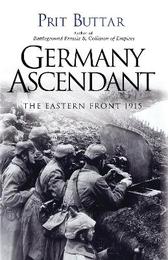
|
Germany Ascendant: The Eastern Front 1915
Paperback / softback
Main Details
| Title |
Germany Ascendant: The Eastern Front 1915
|
| Authors and Contributors |
By (author) Prit Buttar
|
| Physical Properties |
| Format:Paperback / softback | | Pages:464 | | Dimensions(mm): Height 233,Width 152 |
|
| Category/Genre | First world war |
|---|
| ISBN/Barcode |
9781472819376
|
| Classifications | Dewey:940.425 |
|---|
| Audience | |
|---|
| Illustrations |
16pp plate section in black and white
|
|
Publishing Details |
| Publisher |
Bloomsbury Publishing PLC
|
| Imprint |
Osprey Publishing
|
| Publication Date |
23 February 2017 |
| Publication Country |
United Kingdom
|
Description
The massive offensives on the Eastern Front during 1915 are too often overshadowed by the events in Western Europe, but the scale and ferocity of the clashes between Imperial Germany, Habsburg Austria-Hungary and Tsarist Russia were greater than anything seen on the Western Front and ultimately as important to the final outcome of the war. With the Russians hamstrung by weak supply lines and the Austro-Hungarian leadership committed to a strategy of offensive drives despite diminishing manpower and adverse terrain, the fighting in early 1915 was a costly and futile exercise. By the summer, the Central Powers, increasingly dominated by Germany, had begun to gain the advantage, but even the Gorlice-Tarnow Offensive of 1915 - which ultimately resulted in the retreat of Russian forces from Poland - failed to bring the conflict to a conclusion. Now with the work of internationally renowned Eastern Front expert Prit Buttar, this fascinating story is finally being told. From the bitter fighting in the Carpathian Mountains, to the sweeping advances through Serbia and the almost medieval battle for the fortress of Przemysl, this is a staggeringly ambitious history of some of the most important moments of the First World War.
Author Biography
Prit Buttar studied medicine at Oxford and London before joining the British Army as a doctor. Since leaving the army, he has worked as a GP, first near Bristol and now in Abingdon. He is extensively involved in medical politics, both at local and national level, and served on the GPs' Committee of the British Medical Association. He appears from time to time on local and national TV and radio, speaking on a variety of medical issues. He contributes regularly to the medical press. He has written a novel, and his first work of military history, Battleground Prussia (2010), received critical acclaim. Between Giants was his second book for Osprey. Alongside his two titles on World War II, Buttar is mid-way through a four-book series looking at the Eastern Front in World War I for Osprey, with the first two volumes, Collision of Empires and Germany Ascendant, now available.
ReviewsIn this book Prit Buttar continues his analysis and narrative on what was happening on the Eastern Front in the Great War from his previous Collision of Empires: The War on the Eastern Front in 1914 [Osprey, 2014]. He continues to make the point that most scholars focus on the dreadful suffering and stalemate on the Western Front without any consideration of what was happening on the Eastern Front. This meticulous survey reveals that the Central Powers were making measurable progress to the east with the GoliceTarnow Offensive which led to the retreat of Russian forces from Poland and the occupation of Serbia, being two examples of their advances. These successes were achieved at the expense of massive human losses, basically unreported in the west. However, amidst this success, Prit Buttar does stress that leadership weaknesses on the part of the Central Powers balanced mismanagement on a massive scale by the Russians, leading to an absence of a final success for either side. Prit Buttar communicates his narrative and associated analysis in a very clear manner. This is a book for scholars with a focused interest. By contrast the enormity of the detail will deter the casual enquirer unless they are carefully guided to begin by exploring the opening and concluding chapters. These very carefully both set the scene and also explain what had happened over that year. With that preparation the interested reader might then explore some or all of the key events of the 1915 campaigns in the east. -- Trevor James * The Historian *
|